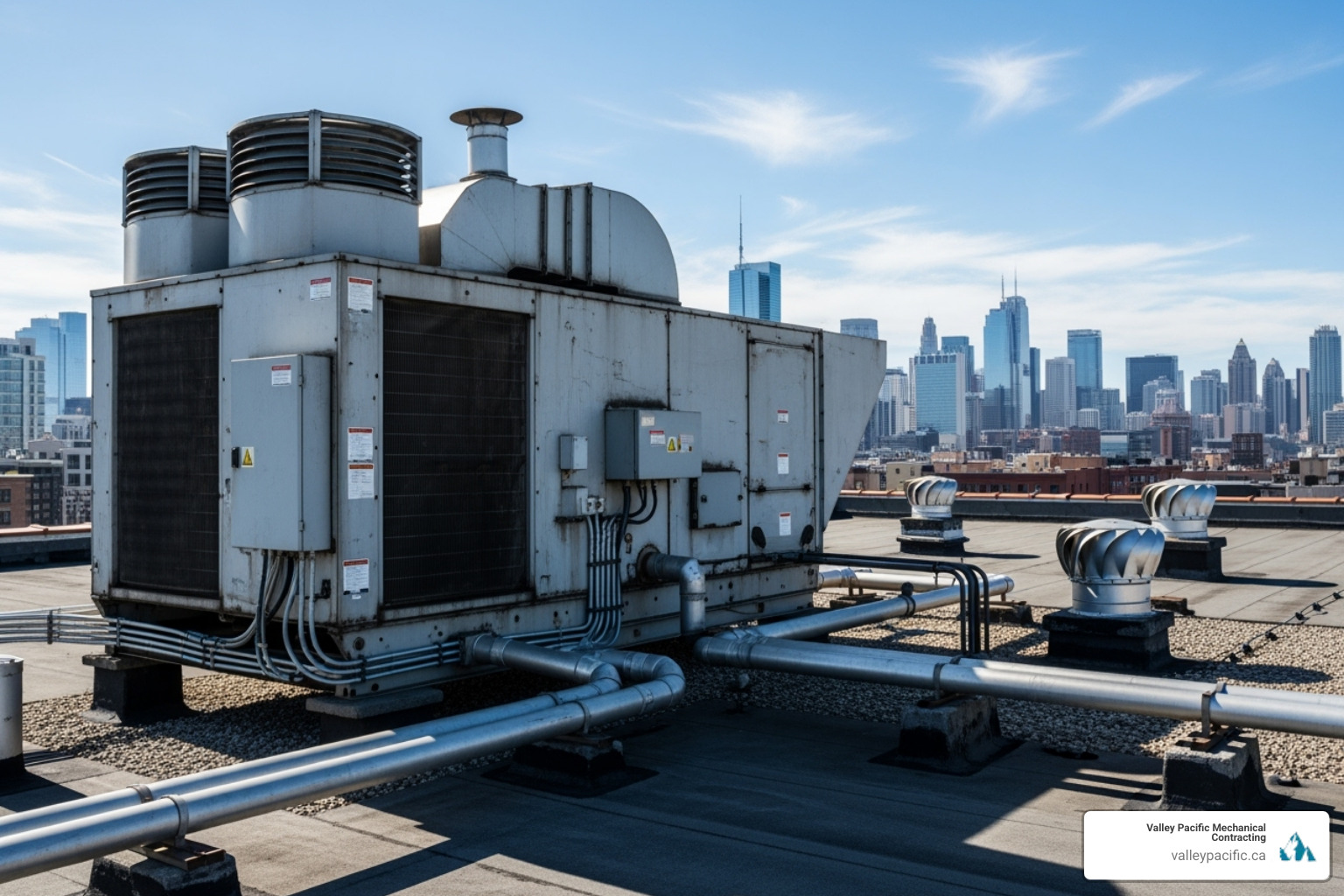Beyond the Thermostat: Mastering Your Commercial HVAC System Check


Why Commercial HVAC System Checks Are Critical for Your Business
A HVAC system check involves a thorough inspection of your heating, ventilation, and air conditioning components to ensure optimal performance, energy efficiency, and safety. For commercial properties, this means examining everything from thermostats and air filters to electrical connections and refrigerant levels.
Essential HVAC System Check Components:
- Thermostat calibration and operation
- Air filter inspection and replacement
- Electrical connections and controls
- Refrigerant levels and leak detection
- Ductwork integrity and airflow
- Safety controls and heat exchanger condition
- Condensate drain functionality
- Blower motor and fan operation
When your commercial HVAC system fails during peak hours, the consequences ripple through your operation. Uncomfortable employees are less productive, customers leave, and energy bills skyrocket. A minor issue can quickly become a major business disruption.
Regular HVAC system checks prevent these costly surprises. Annual inspections reduce repair needs and improve energy efficiency, catching small problems before they become expensive emergencies. Well-maintained systems operate more efficiently, using less energy and extending equipment lifespan.
The stakes are particularly high for commercial properties. A cracked heat exchanger poses serious safety risks due to potential Carbon Monoxide leaks. Ductwork problems can cause 20-30% of conditioned air to be lost, directly impacting your bottom line. These issues don't announce themselves - they develop quietly until they cause major problems.
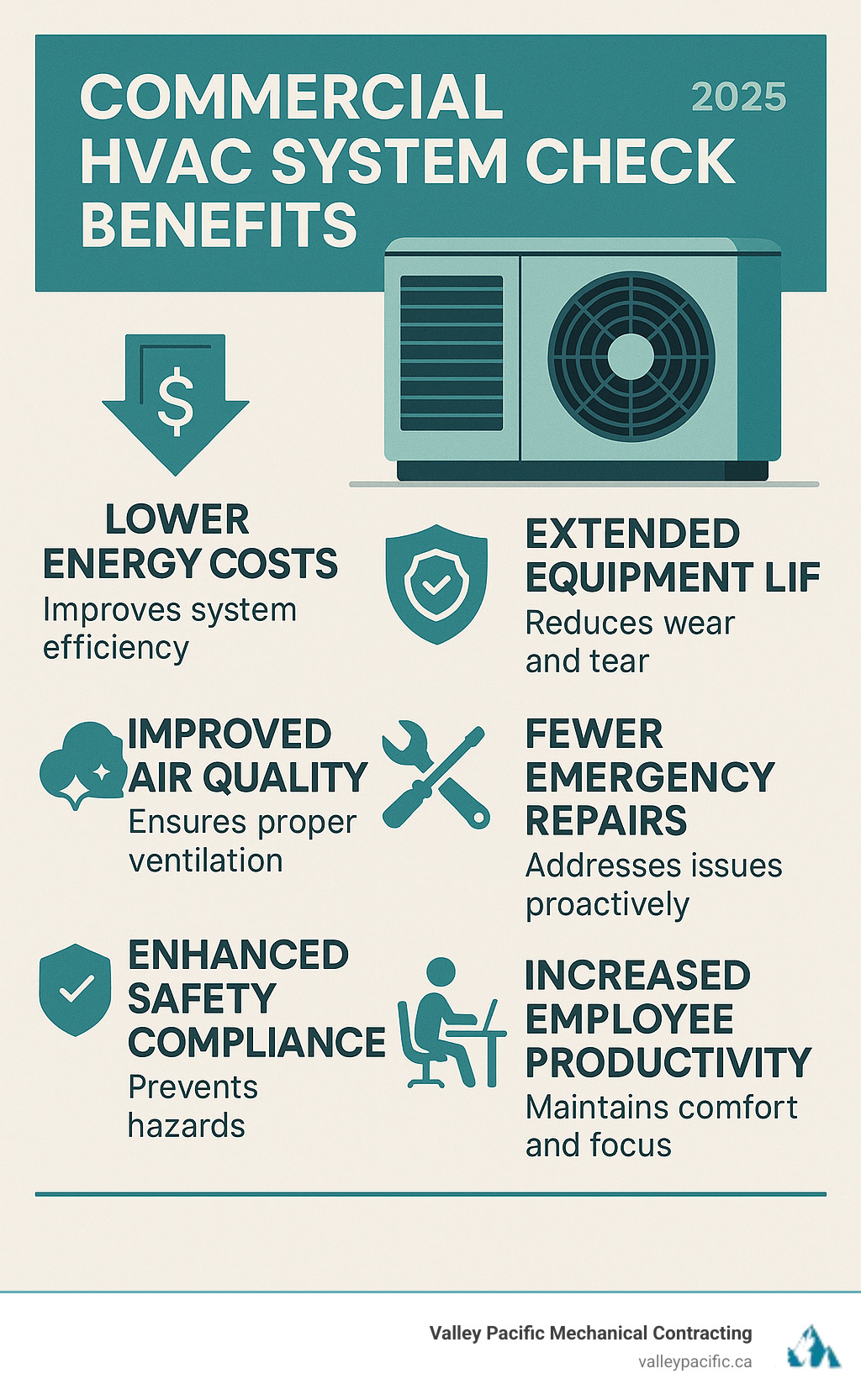
Why Regular HVAC Checks are Non-Negotiable for Your Business
Your HVAC system is likely the last thing on your mind when business is running smoothly. But that quiet hum keeps your operation comfortable, productive, and profitable. When it stops, everything else can grind to a halt.
Regular HVAC system checks are essential for any business wanting to avoid nasty surprises. Like a doctor's checkup, catching problems early saves you from major headaches and bills down the road.
The importance of maintenance goes beyond just keeping things running. A well-maintained system delivers significant cost savings through improved energy efficiency. Systems with regular attention use less energy, which translates directly to lower utility bills.
System longevity is another huge win. Proper care can add years to your commercial HVAC equipment's life, helping you avoid the cost of a premature, unexpected replacement.
Your Indoor Air Quality (IAQ) depends on a clean system. Dirty filters and coils don't just waste energy; they circulate dust, allergens, and harmful particles throughout your workspace.
Many business owners don't realize warranty preservation requires documented maintenance. Skipping regular checks can void your warranty, leaving you to pay for covered repairs. Our Seasonal Heat Pump Maintenance Tips can help.
Preventing major breakdowns is where maintenance really pays off. Ignored small issues like loose connections or minor leaks can become catastrophic failures. These often happen during extreme weather when you need your system most. Watch for HVAC System May Fail Soon: Signs to stay ahead of trouble.
Don't forget legal compliance. Many commercial properties must meet specific maintenance and safety standards, especially for gas equipment. Regular inspections ensure you meet all necessary codes.
The High Cost of Neglect
Ignoring your HVAC system is like playing Russian roulette with your business. The consequences hit hard and fast when things go wrong.
Unexpected downtime can shut down your operation. A restaurant losing AC during a heatwave or an office without heat in January means lost revenue, missed deadlines, and frustrated clients.
Expensive emergency repairs are the reality of neglect. Sudden failures mean overtime charges, rush orders for parts, and premium rates. These fixes often cost far more than routine maintenance.
Reduced equipment lifespan means buying replacements years earlier than planned. Poorly maintained systems wear out faster, creating a massive, unplanned capital expense. Check out these Signs You Need a New AC Installation.
Higher utility bills sneak up on you. Dirty components and inefficient operation force your system to work overtime, consuming more energy. These inflated bills eat away at your profit margins.
Uncomfortable employees and customers create problems beyond temperature. Poor conditions kill productivity and morale. For customer-facing businesses, discomfort drives people away and damages your reputation.
Most seriously, potential safety hazards put lives at risk. A cracked heat exchanger can leak deadly carbon monoxide, and faulty electrical components can cause fires. No responsible business owner can ignore these risks.
The ROI of Proactive Maintenance
Smart business owners know regular HVAC system checks are an investment that pays dividends, not an expense.
Lower energy consumption delivers immediate savings. Well-maintained systems operate at peak efficiency, using less power. Many businesses find these savings alone cover their maintenance costs within a year.
Fewer repair calls mean fewer disruptions and predictable expenses. Catching small problems during routine inspections helps you avoid emergency breakdowns that happen at the worst times.
Extended system life protects your capital investment. Consistent HVAC maintenance can add years to your equipment's lifespan, delaying replacement costs and allowing for better financial planning.
Budget predictability gives you peace of mind. A solid maintenance plan helps you anticipate HVAC expenses and avoid shocking repair bills. Our Maintenance Plan makes this easy.
Improved air quality and health benefits everyone. Clean systems mean cleaner air, leading to fewer sick days, better productivity, and a more pleasant environment for all.
Manufacturer warranty compliance protects your investment. Most warranties require documented professional maintenance. Skipping it can leave you on your own for expensive repairs. Our Comprehensive Heat Pump Service Plans ensure you stay compliant.
The bottom line: Proactive maintenance is the difference between smooth operations and costly surprises.
Your Comprehensive Commercial HVAC System Check Checklist
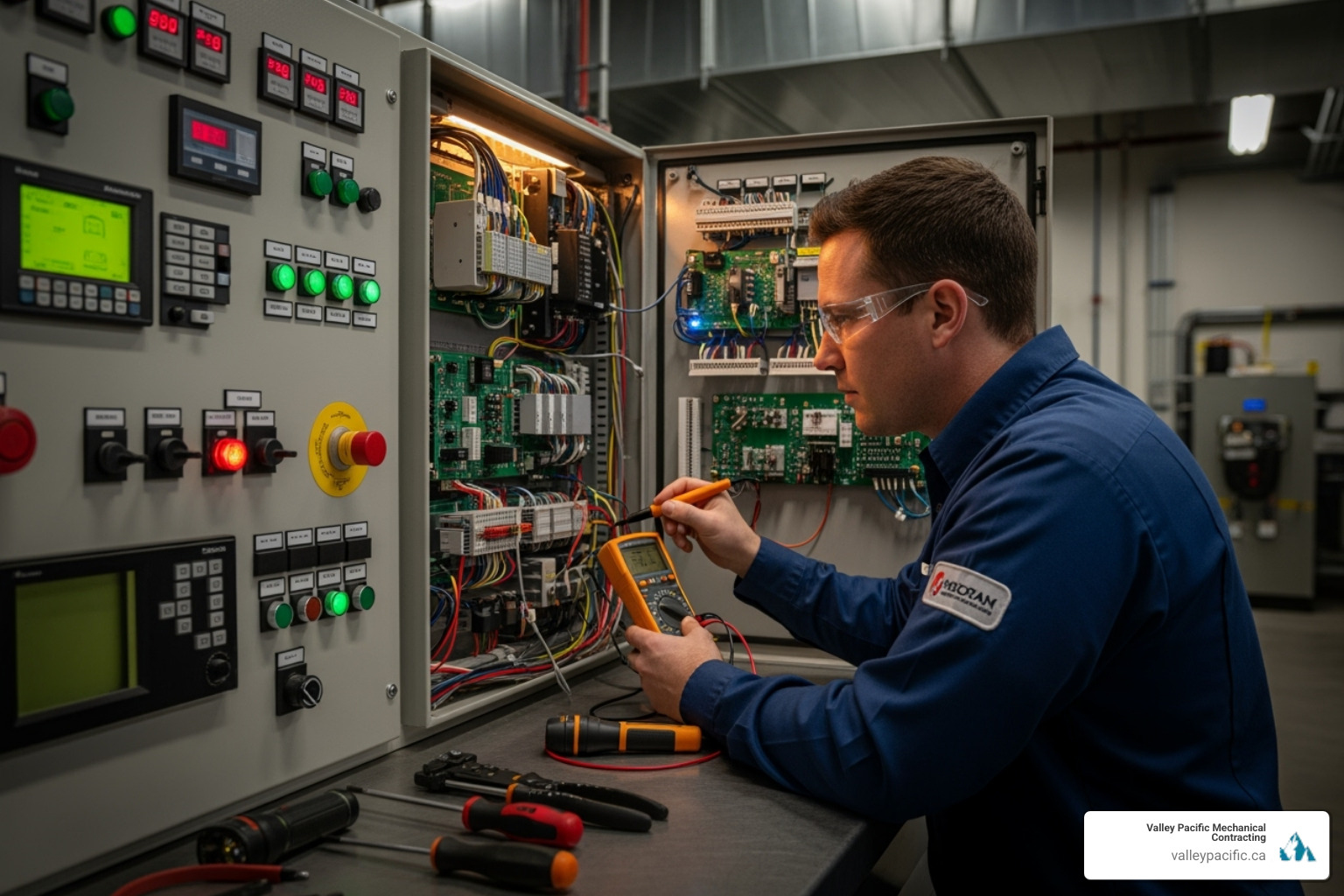
Think of your HVAC system check like a medical exam for your building. Some tasks are fine for your team, while others need a professional's trained eye. The key is knowing which is which.
A comprehensive inspection involves two task categories. The first includes routine checks your staff can handle safely with basic training as a front-line defense. The second requires specialized equipment and professional experience.
This approach gives you the best of both worlds. Your team catches obvious issues early, while trained technicians handle complex diagnostics and safety-critical inspections.
DIY HVAC System Check: What Your Team Can Handle
Your internal team plays a crucial role in maintaining your HVAC system between professional visits. These tasks can catch problems before they become expensive emergencies.
Thermostat verification: Check that thermostats match your business schedule and desired temperatures. Use an independent thermometer to compare readings. If they're off by more than a few degrees, your system may be overworking.
Air filter inspection and replacement: A dirty air filter is a common problem. A clogged filter forces your system to strain. Check filters monthly and replace them at least every 90 days, or more often in dusty environments.
Visual inspection of units: Regularly walk around your equipment. Look for loose panels, strange smells, unusual condensation, or visible damage. This is your first line of defense.
Clearing debris from outdoor units: This is crucial after storms or in the fall. Keep at least two feet of clearance around condenser units. Gently rinse coils with a garden hose; avoid pressure washers which can cause damage.
Checking for unobstructed vents and registers ensures proper airflow. Furniture, equipment, or stored items often block vents, creating hot/cold spots and forcing your system to work overtime.
Condensate drain checks prevent water damage and mold. Look for standing water in drain pans or clogs. If accessible, flush the drain line with white vinegar every few months to prevent buildup.
Listening for unusual noises: Rattling can mean loose connections. Slapping sounds may suggest something is in the blower. Squealing often indicates worn belts or parts needing lubrication. These are early warnings of developing issues.
When to Schedule a Professional HVAC System Check
While your team handles routine monitoring, the technical heart of an HVAC system check requires professional expertise and specialized equipment.
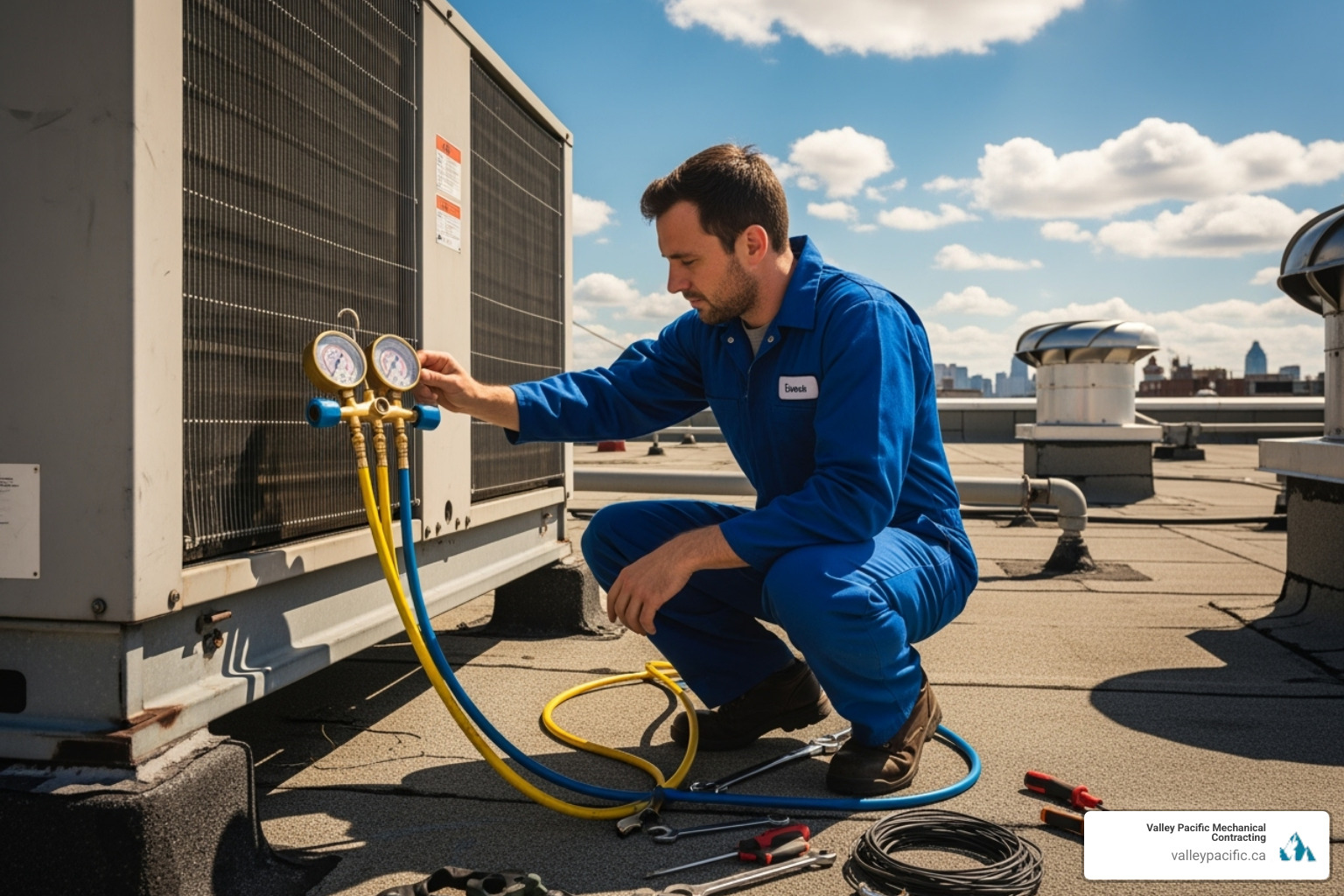
Electrical connections pose serious safety risks. We inspect all wiring, contacts, capacitors, and relays for wear or corrosion. Faulty components can cause system failures, tripped breakers, or fires—this is not a DIY task.
Blower components need detailed inspection and lubrication. We check the blower wheel, bearings, and moving parts. A failing blower motor can shut down your entire system.
Refrigerant levels and leak detection: Low refrigerant almost always indicates a leak in a closed system. We precisely measure levels, use specialized equipment to find leaks, and perform proper repairs. Watch for signs heat pump refrigerant is low between visits.
Ductwork inspection reveals hidden profit drains. Leaky ducts can waste 20-30% of conditioned air, often in inaccessible areas. We inspect the entire system and seal any breaches.
Coil cleaning requires professional techniques. Dirty coils reduce efficiency, and improper cleaning can cause damage. We restore their heat exchange capabilities safely.
Safety control testing protects your property and occupants. High-limit switches, pressure switches, and flame sensors must function perfectly. Our expert heat pump repair services include rigorous testing of these critical systems.
Gas pressure and piping tests are essential for gas systems. We check pressures, inspect for leaks, and verify proper combustion. This work requires professional certification for safety.
Heat exchanger inspection is a critical safety check. Cracks in this component can leak deadly carbon monoxide into your building. This inspection requires specialized equipment and training to detect life-threatening problems.
Common Issues Uncovered & Their Business Impact
During a professional HVAC system check, we often find problems that have been quietly undermining your business. While seemingly minor, their cumulative impact on your bottom line, comfort, and safety can be staggering. Understanding these common issues highlights the value of proactive maintenance.
Ductwork Leaks: The Silent Profit Killer
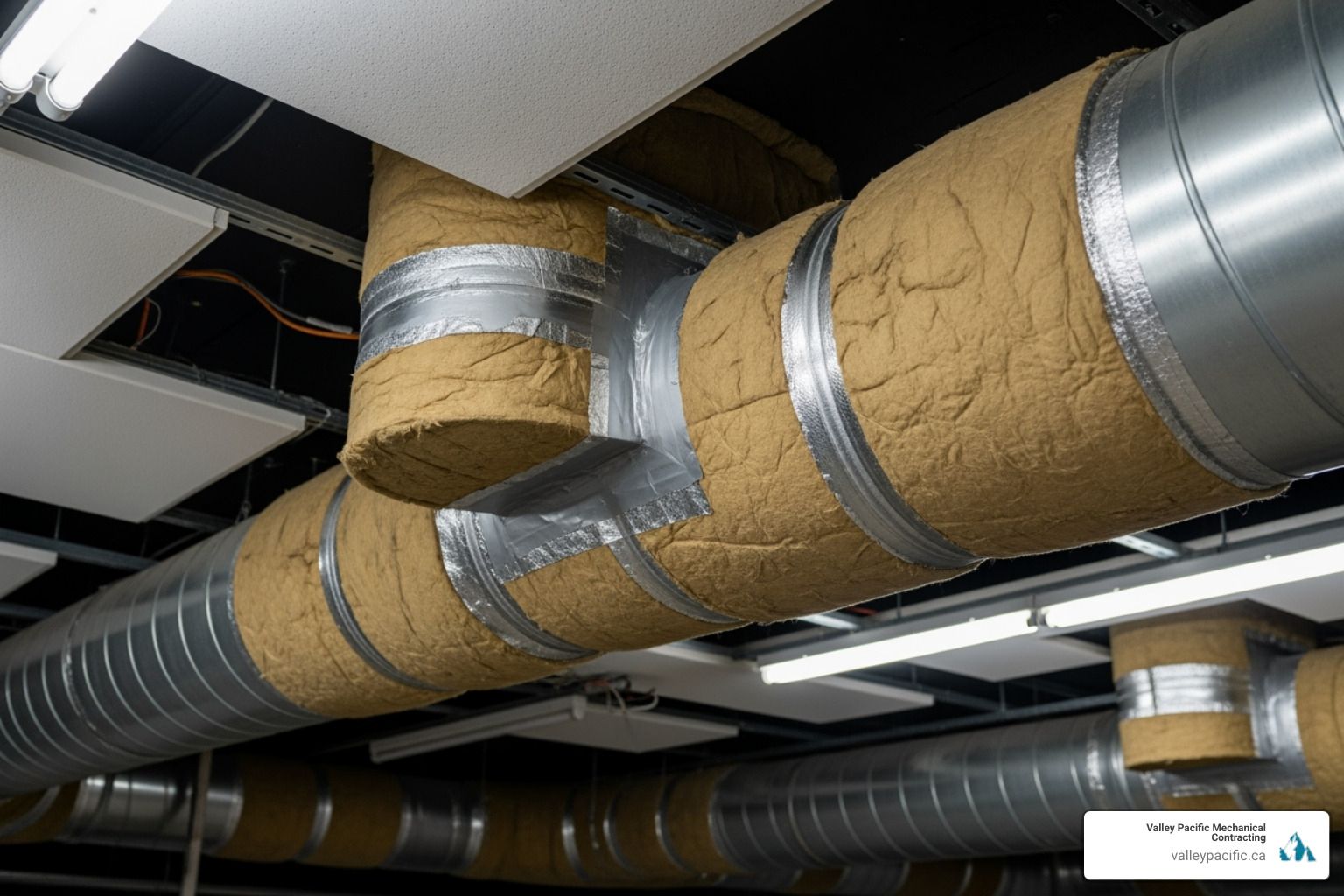
Imagine paying to heat or cool your building, but up to 20-30% of that conditioned air escapes through leaky ductwork into ceilings or walls. It's like filling a bathtub with the drain open—inefficient and costly.
Energy loss from ductwork leaks is a major profit killer. Your HVAC system works overtime to compensate, driving up energy bills. Sealing ductwork can cut heating and cooling costs significantly.
The comfort issues are also frustrating. Inconsistent temperatures create hot and cold spots, leaving employees and customers uncomfortable. Some rooms may be sweltering while others are chilly, regardless of thermostat settings.
Worse, leaky ducts create poor air quality. Gaps pull in dust, insulation fibers, and contaminants from unconditioned spaces, circulating polluted air throughout your building and affecting health and productivity.
Increased operational costs go beyond energy waste. The constant strain on your system wears out expensive components like compressors and blower motors, leading to more breakdowns and a shorter equipment lifespan.
The Heat Exchanger: A Critical Safety Check
A gas furnace's heat exchanger keeps dangerous combustion byproducts separate from your building's air. When this component fails, the consequences can be deadly.
Cracked heat exchangers develop from the metal expanding and contracting over time. Even small cracks create a severe safety hazard, as carbon monoxide can leak into your building's air supply.
Carbon monoxide poisoning can be fatal. The CDC reports hundreds of deaths from carbon monoxide poisoning annually. This colorless, odorless gas gives no warning, making professional inspections critical.
If we find a cracked heat exchanger during an HVAC system check, we must immediately shut down the system. There is no temporary fix; the furnace is unsafe until the heat exchanger is replaced, which often means replacing the unit. For reliable furnace services in Maple Ridge, BC, our team prioritizes your safety.
Refrigerant and Electrical Faults
These are two of the most common and devastating problems we find. Both can bring your system to a halt unexpectedly.
Low refrigerant levels are a sign of trouble. An AC system is a closed loop and shouldn't need refrigerant "topped off." Low levels mean there's a leak. Adding refrigerant without fixing the leak is wasteful and irresponsible.
When refrigerant is low, your system struggles to cool. This is a major problem during summer, when your AC might stop cooling during heatwaves. The compressor works harder, consuming more energy and wearing out faster.
Worn electrical contacts and tripped breakers can be early warnings of bigger problems. Loose connections cause frustrating intermittent operation. Electrical faults can also cause your AC to run constantly without cooling properly.
The worst-case scenario is compressor damage. The compressor is the heart of your cooling system, and replacing it is one of the most expensive HVAC repairs. Many electrical and refrigerant issues are precursors to compressor failure. Catching them early saves thousands and prevents unexpected shutdowns.
Frequently Asked Questions about Commercial HVAC Inspections
Commercial property managers and business owners have many questions about maintaining their HVAC systems. With over 30 years in business, we've heard most of them. Here are the most common questions we get about commercial HVAC system checks.
How often should our commercial HVAC system be inspected?
The short answer is twice a year, every year. We recommend biannual inspections for commercial HVAC systems to keep equipment running smoothly.
Spring inspections prepare your cooling system for summer. We check refrigerant levels, clean coils, inspect electrical components, and verify thermostat accuracy. This prevents AC failure during the first heatwave.
Fall inspections focus on your heating system, preparing it for winter. We perform critical safety checks on heat exchangers and gas lines, inspect burners, and test ignition systems to prevent you from being left in the cold.
Some businesses, like restaurants, busy retail stores, or manufacturing facilities, are high-usage environments that benefit from more frequent checks. The harder a system works, the more care it needs.
Always follow manufacturer's recommendations. Their maintenance schedules are designed to preserve warranty coverage. Our Comprehensive Heat Pump Service Plans are designed to meet these requirements and keep your system running efficiently.
How much does a professional HVAC inspection cost?
This is a common and fair question, as no business likes expense surprises.
The cost for a professional HVAC system check depends on several factors. Basic tune-ups are more affordable, focusing on essential tasks. Comprehensive inspections involve detailed diagnostics and are a higher investment, especially for larger properties or multiple units.
Cost is influenced by system size and complexity. A small office with one unit differs from a multi-story building with several. The number of units affects time and effort, as does uncovering issues that need immediate attention.
Businesses consistently find that routine inspections pay for themselves through lower energy bills, fewer emergency repairs, and longer equipment life. It's a smart investment. We also offer service agreements to make budgeting easier.
If cost is a concern, we offer Financing to help manage your budget. Contact us for a personalized quote to discuss what works for you.
How long does a commercial HVAC inspection take?
Business owners want to minimize disruption. The good news is most comprehensive inspections take one to three hours per system, and we work to minimize impact on your operations.
Several factors affect timing. Multiple systems take longer, as each unit needs a thorough assessment.
Accessibility matters. Units that are hard to reach, requiring special equipment or maneuvering, take more time to inspect safely and thoroughly.
The condition of your equipment also plays a role. Well-maintained systems are quicker to assess. If we find a significant issue, like a cracked heat exchanger, we'll need more time for diagnostics and to explain our findings.
Finally, detailed reporting is part of our service. We document our findings, recommend repairs, and provide a comprehensive report on your system's health. This is valuable for warranty purposes and future planning.
Ensure Your Business Runs Smoothly with Expert Care
Your business deserves an HVAC system that works flawlessly. A proactive maintenance strategy with regular HVAC system checks is essential for protecting your investment and ensuring your workplace is comfortable and safe for everyone.
Your HVAC system works tirelessly to maintain the perfect environment for employees and customers. Investing in regular maintenance is protecting your investment in your business's future. Preventive care saves you the headache and expense of emergency breakdowns.
Ensuring comfort and safety is more than temperature control. A well-maintained system provides clean air, prevents dangers like carbon monoxide leaks, and creates a thriving environment. Employees stay focused, customers have a positive experience, and you gain peace of mind.
Partnering with experts makes all the difference. At Valley Pacific Mechanical Contracting, we've offered stress-free HVAC maintenance for over 30 years. We understand the challenges commercial properties face in Mission, Maple Ridge, Langley, and the Lower Mainland. Our goal is a 'headache-free' experience so you can focus on your business.
What sets us apart is our commitment to be there when you need us. Our 24/7 emergency service means we're always a phone call away, because emergencies don't follow a convenient schedule.
We stand behind our work with the Daikin Comfort Promise, ensuring every job meets the highest standards. Choosing Valley Pacific Mechanical Contracting means choosing 30 years of expertise, modern solutions, and genuine care for your business.
Don't wait for warning signs to think about your HVAC system. The best time to schedule your commercial HVAC system check is before you need it. Let our experienced team give your system the attention it deserves, so you can have confidence your business is in expert hands.
Ready for proactive care? Contact Us today to find out why so many Lower Mainland businesses trust us to keep their operations running smoothly, comfortably, and efficiently.




